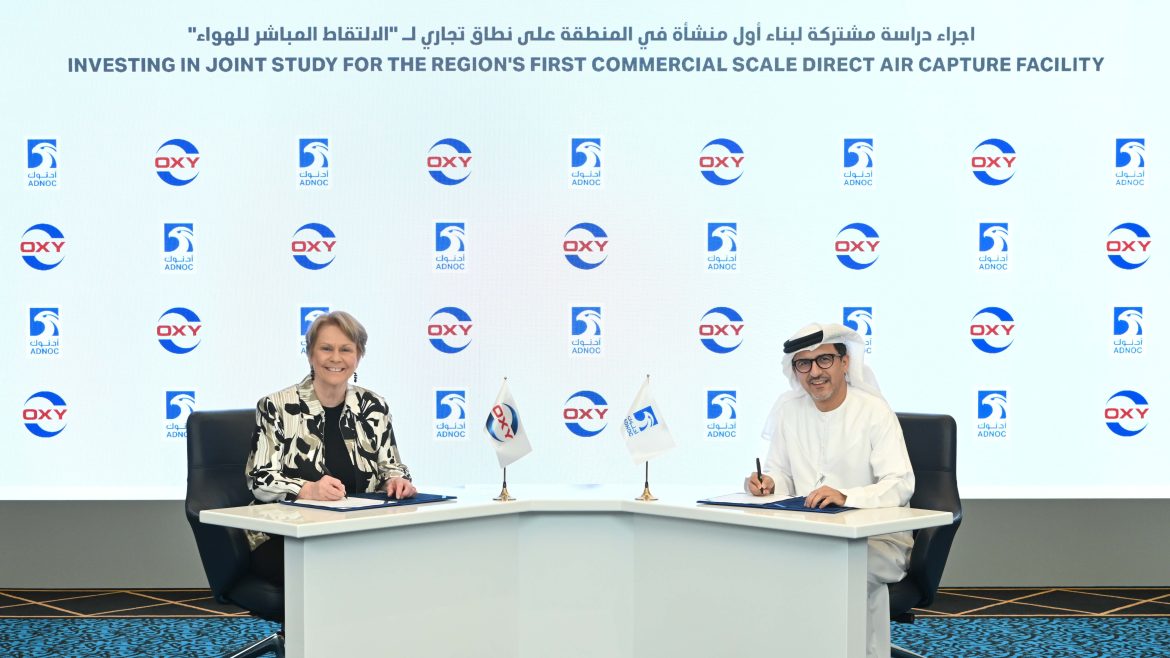Abu Dhabi National Oil Company (ADNOC) and Occidental Petroleum (Oxy) have announced a strategic collaboration to develop the largest direct air capture (DAC) project outside the US. DAC is a technology that extracts carbon dioxide (CO2) from the atmosphere and either stores it underground or uses it to create products.
The project, which could capture up to 1 million tonnes of CO2 annually, is part of the companies’ efforts to accelerate their net zero goals and contribute to the global fight against climate change. ADNOC aims to achieve net zero emissions from its operations by 2045, while Oxy plans to become a carbon management company and produce net zero oil and fuels.
The agreement is enabled by the UAE-US Partnership for Accelerating Clean Energy (PACE), launched in 2020 and expected to catalyze $100 billion in clean energy and carbon management projects by 2035. The partnership is co-chaired by His Excellency Dr. Sultan Ahmed Al Jaber, Minister of Industry and Advanced Technology and ADNOC CEO, and Amos Hochstein, White House Senior Advisor to the President for Energy and Investment.
The two companies will conduct a joint preliminary engineering study on the feasibility of building a DAC facility in the UAE, which would be connected to ADNOC’s existing CO2 infrastructure. They will also explore opportunities to progress their carbon capture and storage (CCS) programs in the US and the UAE and other decarbonization technologies such as mineralization and biosynthesis.
ADNOC and Oxy are not the only ones pursuing DAC to reduce emissions. Several other projects are underway or planned worldwide, such as in Canada, Switzerland, Iceland, and Norway. According to the International Energy Agency (IEA), DAC could play an important role in achieving net zero emissions by 2050, but it requires significant cost reductions and scale-up.
The announcement comes as the UAE prepares to host the COP28 climate talks in 2023, hoping to showcase its leadership in clean energy and carbon management. The country has already set ambitious targets for renewable energy, hydrogen, and CCS and has invested in research and innovation to support its transition.
By collaborating with Oxy, ADNOC hopes to leverage its expertise and experience in CO2 management and enhance its sustainability strategy. The company has already implemented several projects to reduce its emissions intensity, such as flaring reduction, energy efficiency, and CCS. It also plans to eliminate methane emissions by 2030.
The project also demonstrates Oxy’s vision of becoming a Tesla of carbon capture, as its CEO Vicki Hollub said in a recent interview. The company believes that DAC and CCS can provide a way to balance emissions that are hard to avoid, such as from aviation and heavy industry, and create new revenue streams from carbon-neutral products.
The project is expected to create economic and environmental benefits for both countries and contribute to global efforts to limit global warming. It also shows how collaboration and innovation can help overcome the challenges of climate change and create a more sustainable future.
Source: Energy Voice



